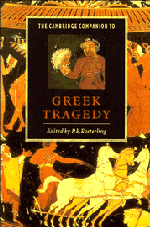5 - The sociology of Athenian tragedy
from Part II - The plays
Published online by Cambridge University Press: 28 May 2006
Summary
INTRODUCTION
In the modern sense of the word 'democracy' it is the tragic treatment of the un-democratic aspects of Athenian society which has been the focus of much recent scholarship. The Athenian democracy was a xenophobic, patriarchal, and imperialist community, economically dependent on slavery and imperial tribute, and tragedy has proved susceptible to interpretations disclosing its expression of ideas necessary to the system's perpetuation, ideas implying the inferiority of foreigners, women and slaves. This scholarly perspective is inseparable from its own social context, which has since the early 1960s been characterised by the unprecedented success of feminism and anti-racism.
This chapter suggests that through some recurrent types of plot-pattern tragedy affirmed in its citizen spectators' imaginations the social world in which they lived. The focus is on three types of pattern - plays in which male Athenian performers represented (i) mythical Athenians interacting with outsiders, (ii) women, (iii) significant slaves. Non-Athenians, women, and slaves were in reality excluded from the assembly and normally had to be represented by a citizen in the lawcourts (cf. Chs. 1 and 3 above, pp. 26-31; 61-6).
- Type
- Chapter
- Information
- The Cambridge Companion to Greek Tragedy , pp. 93 - 126Publisher: Cambridge University PressPrint publication year: 1997
- 68
- Cited by

